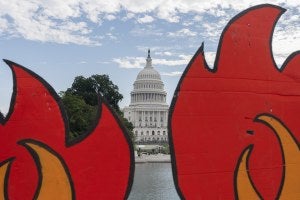Asian, Hispanic, and Black Americans are more likely to view climate change as a threat than Americans as a whole, data show.
In the United States, definitions of national security threats are shifting, highly politicized, and closely tied to identity. At the same time, the US is more racially diverse than at any time in its past. To better understand how this diversity feeds into threat perception, the Chicago Council on Global Affairs and the New America Foundation have partnered to conduct novel research on the views of white, Black, Asian, Hispanic, and Native Americans as part of the 2022 Chicago Council Survey.
Key Findings
- Overall, 56 percent of Americans consider climate change a critical threat to the United States. Concern is highest—at solid majorities—among Hispanic Americans (70%), Asian Americans (65%), and Black Americans (65%).
- Asian Americans (66%) and Hispanic Americans (62%) are the most likely to view climate change as a serious and pressing problem that needs action now, even if it involves significant costs to the United States.
- Majorities of Asian Americans (64%), Hispanic Americans (62%), and Black Americans (54%) say the United States should take a leading role in the international effort to limit climate change.
Majorities of Hispanic, Black, and Asian Americans View Climate Change as a Critical Threat
According to the United Nations, climate change is “the defining issue of our time,” manifesting in shifting weather patterns that impact agricultural production, catastrophic storms, fires, and droughts. The 2022 Chicago Council Survey finds that 56 percent of the overall American public considers climate change a critical threat to the United States. Concern is even higher among Hispanic Americans (70%), Asian Americans (65%), and Black Americans (65%).
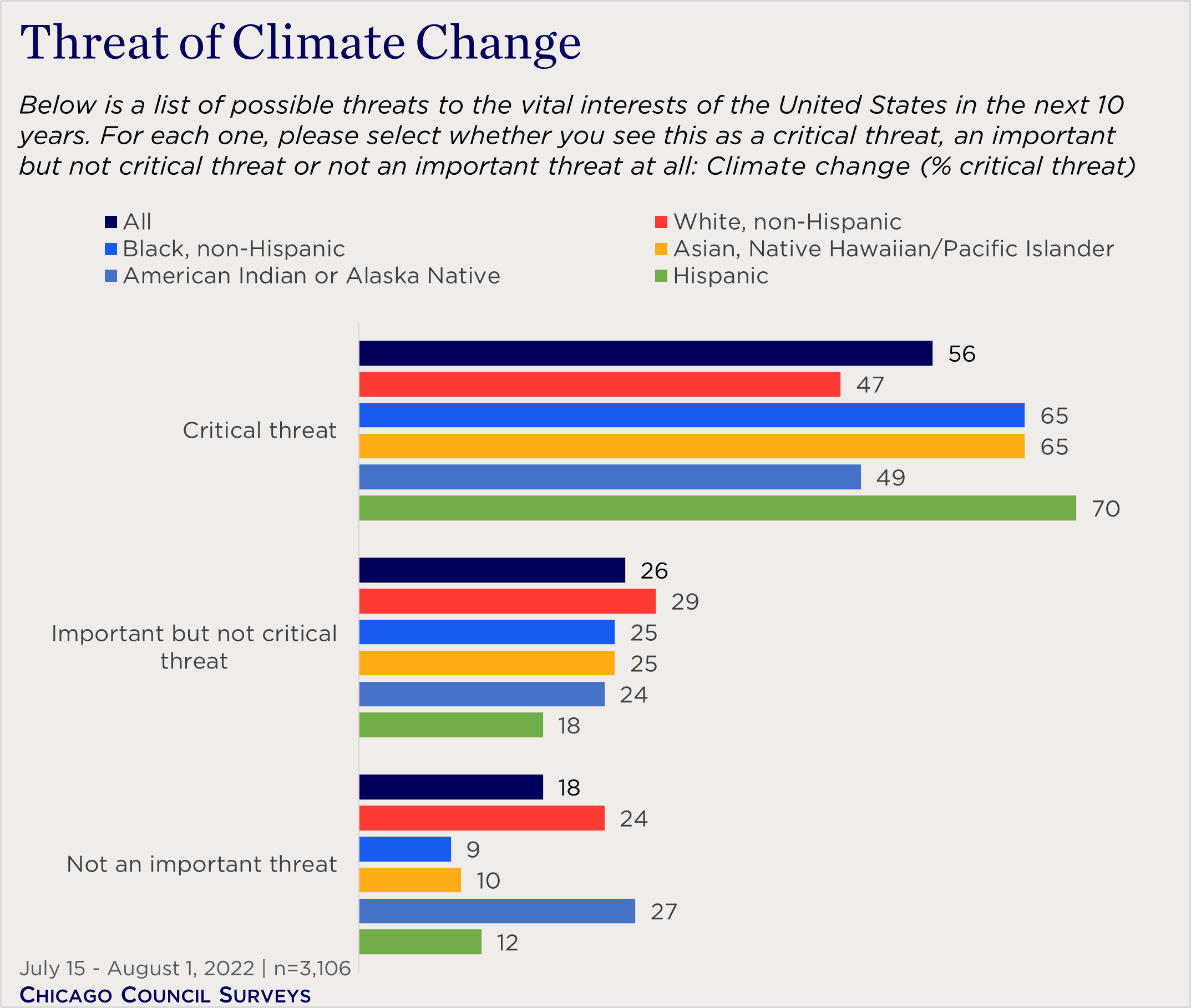
These differences largely overlap with the differing partisan preferences of racial and ethnic groups. Across racial lines, between three in four and nine in 10 Democrats view climate change as a critical threat to the country, with Asian American and Pacific Islander (AAPI) Democrats the most concerned (88%) and Black Democrats the relatively least concerned (73%). Because few Black (6%) or Asian Americans (16%) identify themselves as Republicans, our estimates of their views are less precise, but the data suggest that no more than a third of any Republican subgroup views climate change as a critical threat.
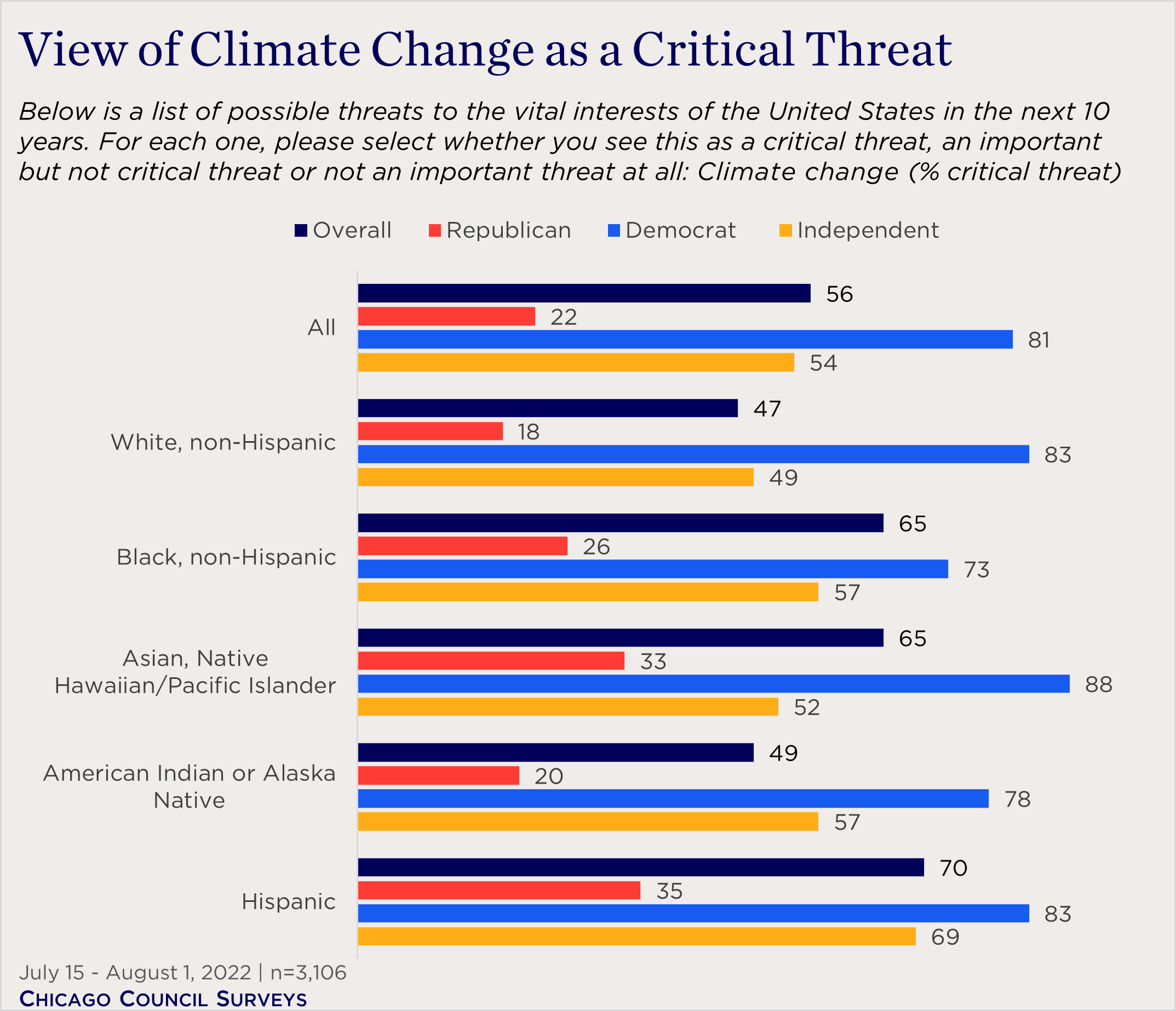
Support for Taking Action on Climate Change
With large majorities of Asian, Black, and Hispanic Americans seeing climate as a critical threat, it should be of little surprise that majorities of all three groups want to take immediate action on the problem. Asian Americans (66%) and Hispanic Americans (62%) are the most likely to view climate change as a serious problem that needs action now, considerably higher than the overall average of 50 percent. A majority of African Americans agree (53%), as do pluralities of Native Americans (46%) and white Americans (44%).
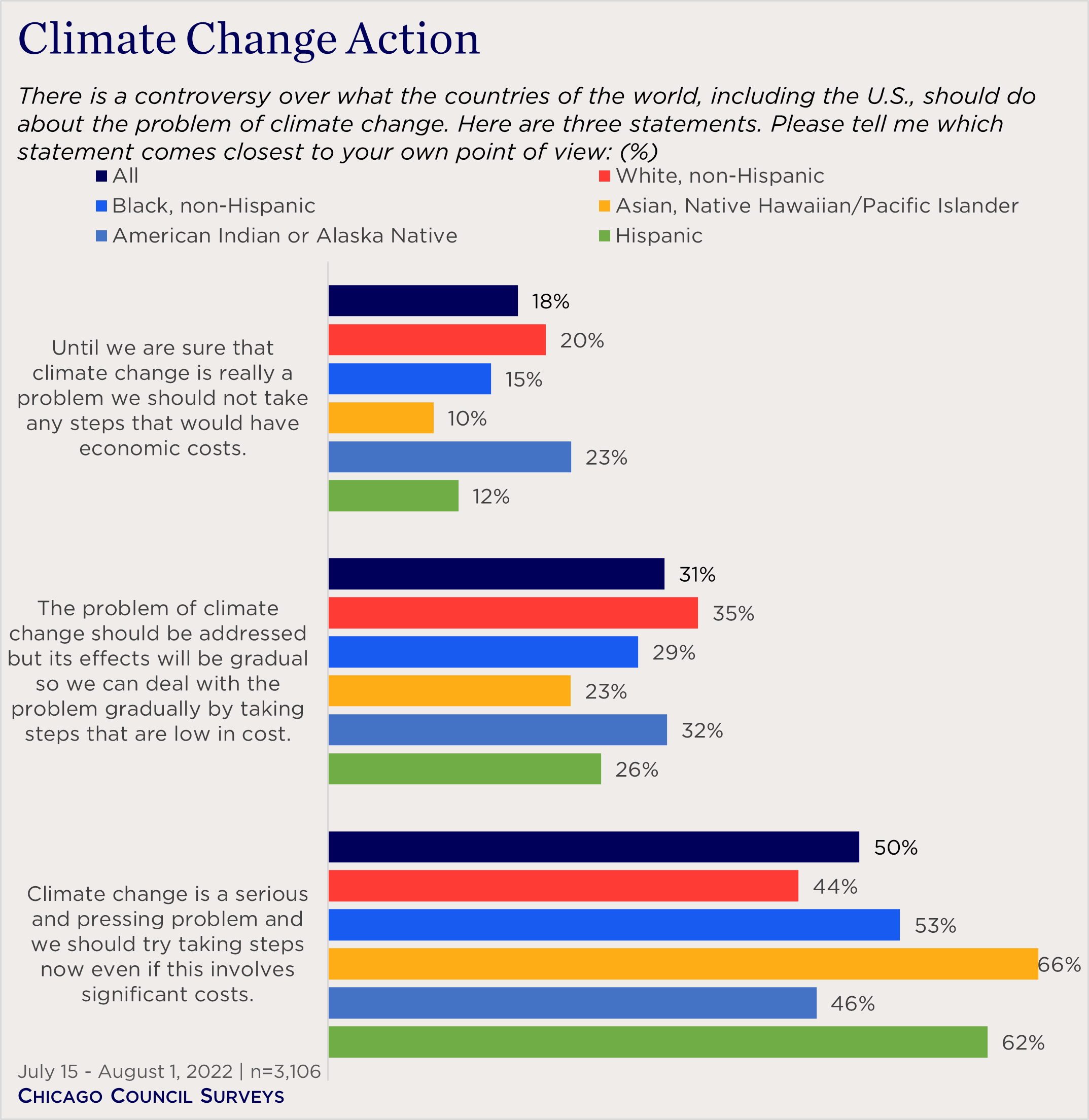
Support for taking urgent action on climate change generally reflects how different groups think about climate change as a threat, though in this regard, Black Americans are something of an outlier. Two-thirds of Black Americans (65%) see climate change as a critical threat to the country, yet only 53 percent say the United States should take action now even if it involves significant costs. That difference also holds when looking just at the views of Democrats, who are generally inclined to take immediate action on climate change. Though a majority of Black Democrats (61%) say the country should take steps now even if it involves significant costs, this is the lowest of all Democratic groups. Asian (84%), white (81%), and Hispanic (73%) Democrats are all notably more likely to support taking immediate action.
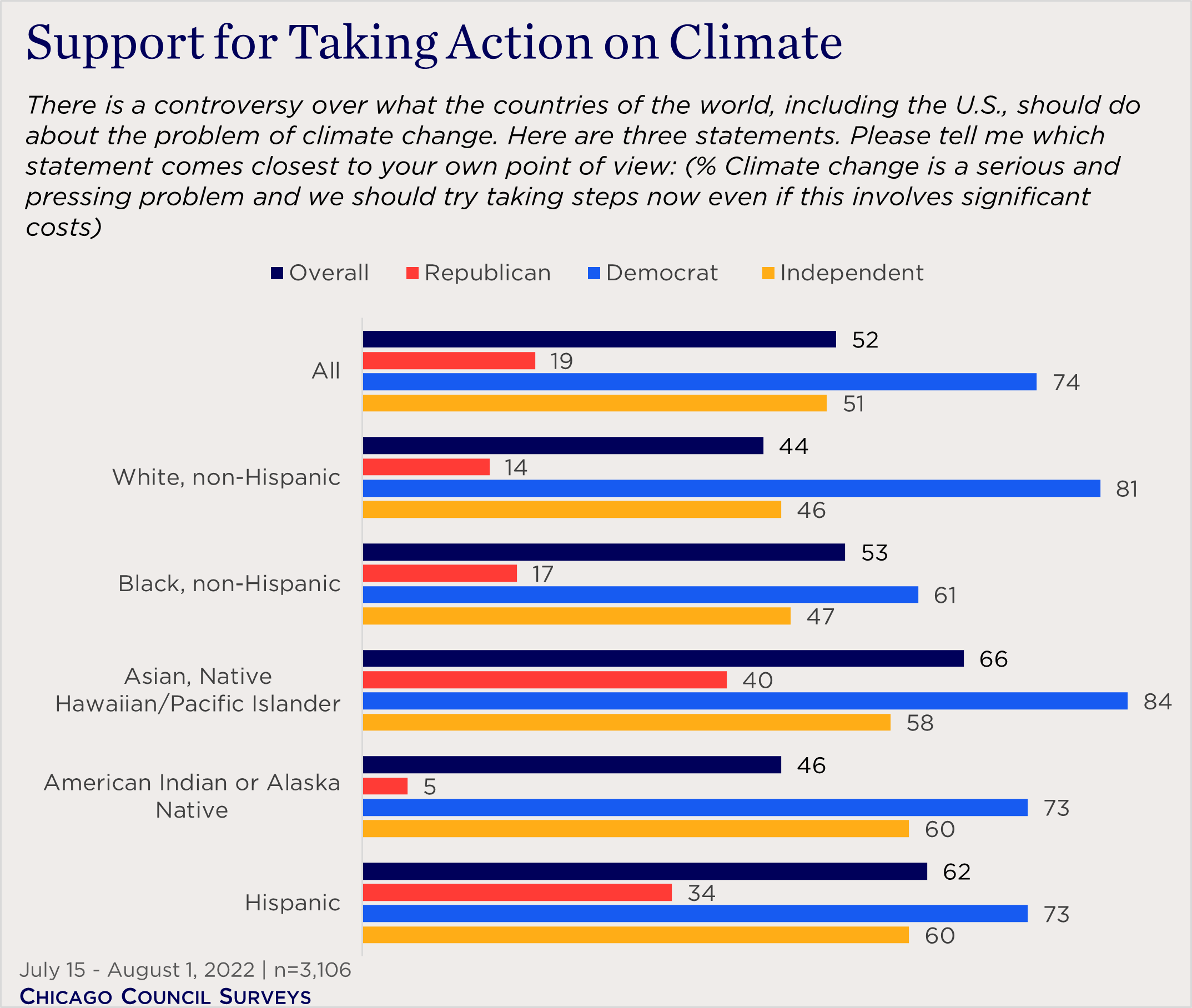
This difference between Black Democrats and other Democrats may in part reflect a broader sensitivity among African Americans to the costs of US policies. In other items in the 2022 Chicago Council Survey that specifically invoke the prospect of costs to American households, African American respondents tend to be less supportive of the item in question. This could be due to the lower incomes earned by African American households, making them more susceptible to potential economic consequences of major US policy decisions.
Different Views of the US Role in Limiting Climate Change
A third issue in dealing with climate change is the role the United States should play in tackling a global problem. Majorities of Asian Americans (64%), Hispanic Americans (62%), and Black Americans (54%) say the country should take a leading role in the international effort to limit climate change, higher than the US public overall average (50%). Pluralities of Native Americans (46%) and white Americans (42%) also support a leading role for the United States.
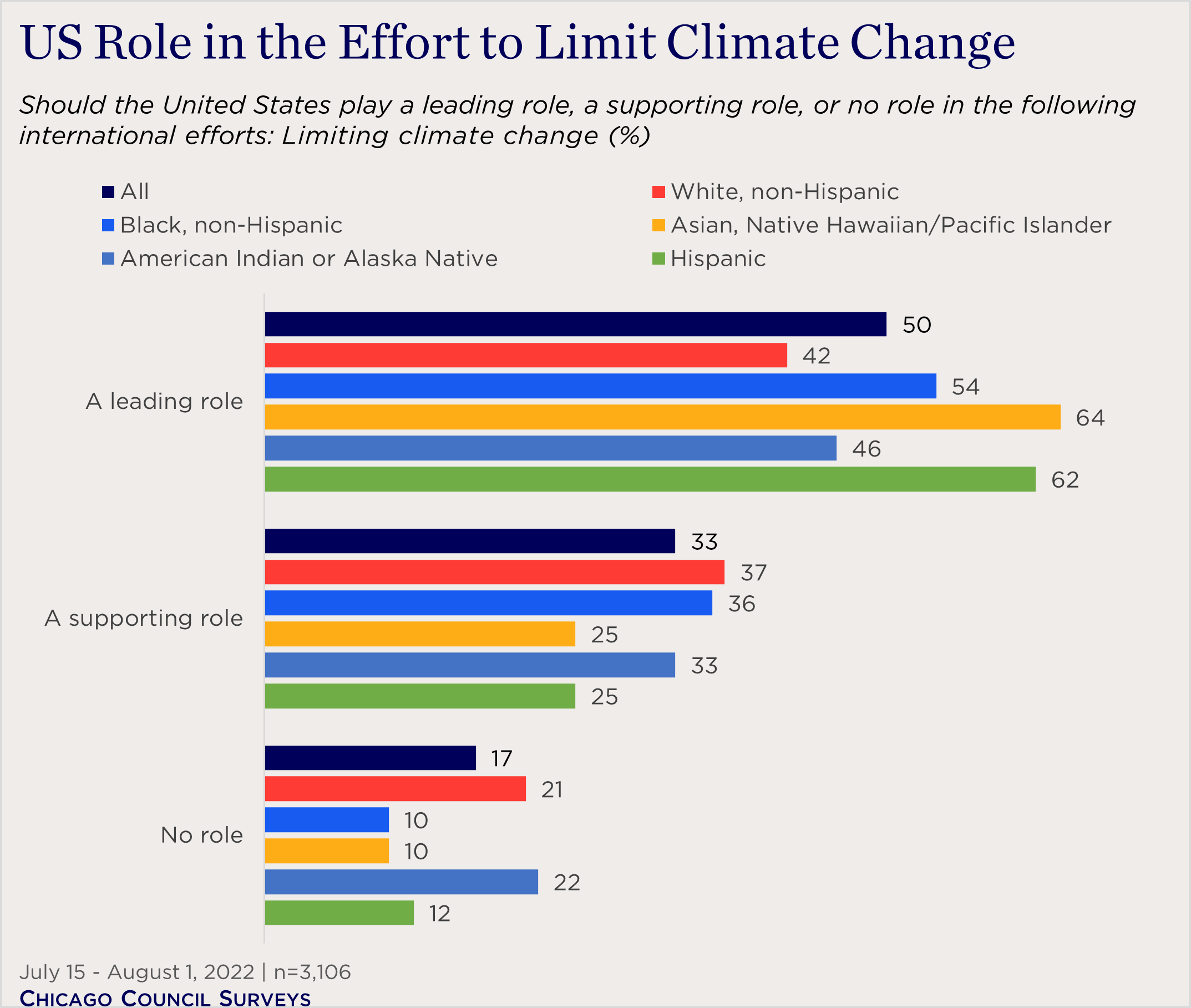
Partisanship is also associated with American attitudes toward US involvement in the global effort to limit climate change. Across the board, Democrats are consistently and substantially more likely than other Americans to say the United States should take a leading role internationally on climate (73%, compared to 49% of Independents and 20% of Republicans), with Asian American and Pacific Islander Democrats (84%) the most likely to say so. Black Democrats are the least likely to say so, though six in 10 (61%) still prefer a leading role for the United States.
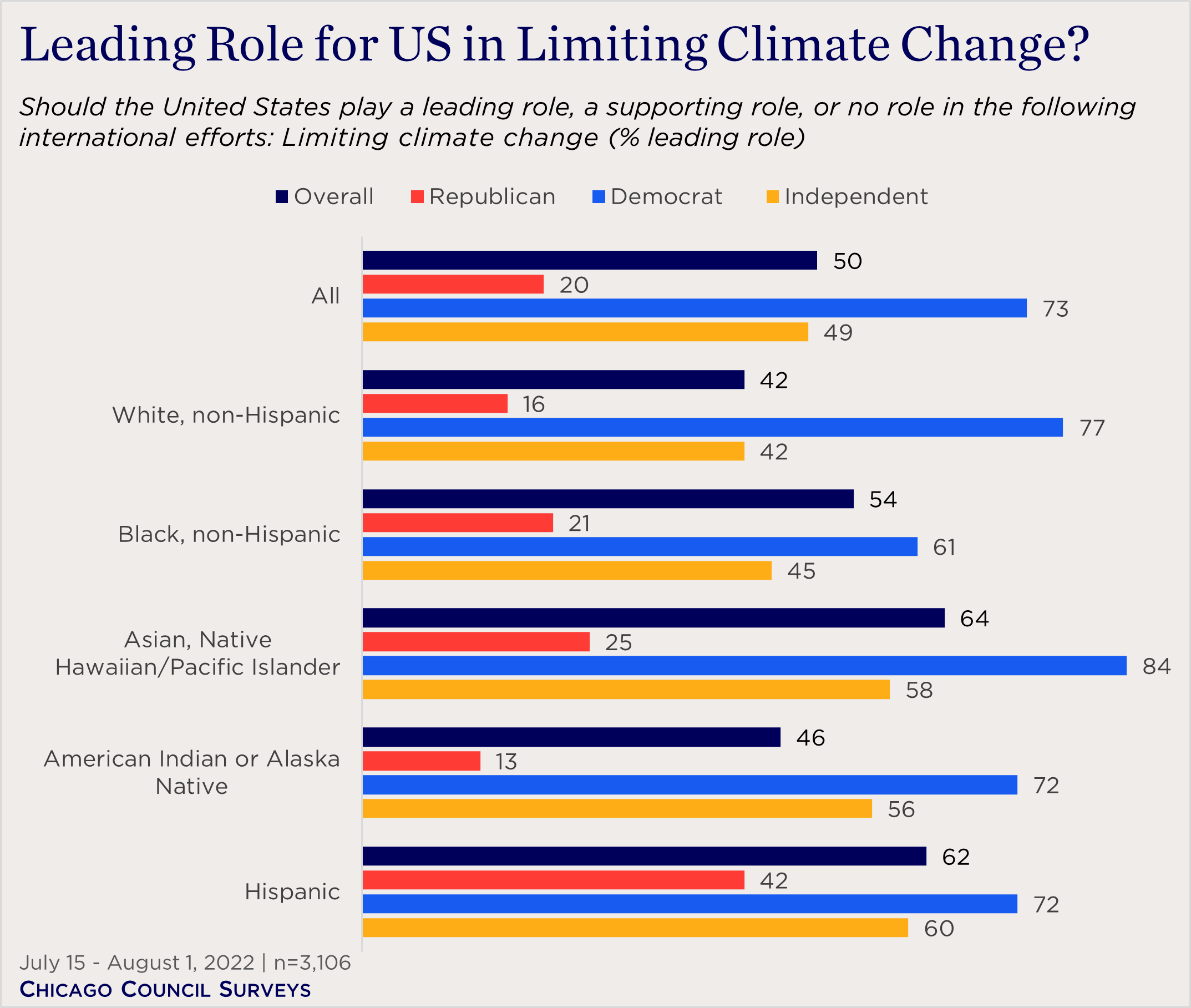
Though partisanship is strongly associated with American views on climate change, partisanship is not associated with each racial and ethnic group to the same degree. Hispanic Americans are a prime example. Hispanic Republicans are notably more concerned about the threat of climate change than other Republicans, and indeed, a plurality of Hispanic Republicans favor the United States taking a leading role in the effort to limit climate change (42%). By contrast, a majority of all other Republican subgroups favor the country playing a supporting role in climate change efforts. This may reflect Hispanic Americans’ higher concerns around climate change as well as their internationalist inclinations in US foreign policy, an issue previously explored by the Chicago Council in 2015.
Conclusion
As Chicago Council Surveys have tracked over the past decade, Americans—and especially those who identify as Democrats—have become increasingly likely to view climate change as a critical threat to the United States. Part of that change has come from the growing diversity of the United States, especially among younger generations, as Asian Americans, Hispanic Americans, and Black Americans are notably more likely to view climate change as a threat than Americans as a whole. Moreover, both Asian Americans and Hispanic Americans are more likely than Americans overall to support taking action on climate change now and to favor the United States playing a leading role in international efforts to limit climate change. By contrast, white and Native Americans are less concerned about climate change and are also less likely to support immediate action or a leading role for the United States in limiting global climate change.
That said, across all racial and ethnic groups, partisan affiliation is highly associated with Americans’ views on the danger of climate change and the urgency of taking actions to address it. The deep partisan divisions around climate change—a division that manifests across racial and ethnic lines—will make addressing the problem all the more difficult. And given different groups’ varied concerns, such as African Americans’ heightened concerns about the costs of climate policies and Republicans’ lack of concern around climate change as an issue, policymakers will have to be careful in crafting their proposals and in selecting the language used to describe them.










This analysis is based on data from the 2022 Chicago Council Survey of the American public on foreign policy, a project of the Lester Crown Center on US Foreign Policy. The 2022 Chicago Council Survey was conducted July 15–August 1, 2022 by Ipsos using its large-scale nationwide online research panel, KnowledgePanel, in both English and Spanish among a weighted national sample of 3,106 adults aged 18 or older living in all 50 US states and the District of Columbia. The margin of sampling error for the full sample is +/- 1.8 percentage points. The margin of error is higher for partisan subgroups or for partial-sample items.
Partisan identification is based on how respondents answered a standard partisan self-identification question: “Generally speaking, do you think of yourself as a Republican, a Democrat, an Independent, or what?”
The 2022 Chicago Council Survey is made possible by the generous support of the Crown family and the Korea Foundation. With the support of New America Foundation, the survey also includes specific oversamples of Hispanic, Asian-American/Pacific Islander, Black, and Native American respondents. See the Appendix for more specifics on these sample group sizes and characteristics.
|
2022 Chicago Council Survey Demographics by Race/Ethnicity |
||||||
|
|
|
White, non-Hispanic (n=1534) |
Black, non-Hispanic (n=470) |
Asian, Native Hawaiian/ Pacific Islander (n=405) |
American Indian or Alaska Native (n=123) |
Hispanic (n=538) |
|
|
Average age |
51 |
46 |
46 |
50 |
43 |
|
Gender |
||||||
|
|
Female |
51 |
55 |
54 |
54 |
50 |
|
|
Male |
49 |
45 |
46 |
46 |
50 |
|
Education |
||||||
|
|
Less than high school |
6 |
9 |
4 |
18 |
25 |
|
|
High school |
27 |
35 |
16 |
19 |
33 |
|
|
Some college |
28 |
30 |
23 |
44 |
24 |
|
|
Bachelor's degree or higher |
39 |
26 |
57 |
20 |
18 |
|
Ideology |
||||||
|
|
Liberal |
26 |
35 |
36 |
18 |
32 |
|
|
Moderate |
33 |
44 |
38 |
41 |
39 |
|
|
Conservative |
40 |
18 |
25 |
35 |
28 |
|
Partisanship |
||||||
|
|
Republican |
35 |
6 |
17 |
28 |
17 |
|
|
Democratic |
25 |
61 |
46 |
21 |
44 |
|
|
Independent |
39 |
31 |
36 |
47 |
39 |
Related Content
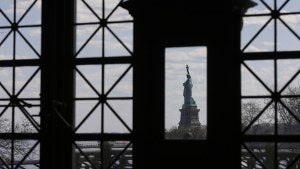 Public Opinion
Public Opinion
Political affiliation is far more closely associated with immigration policy preferences than race or ethnicity, polling finds.
 Climate and the Environment
Climate and the Environment
While younger Americans are most concerned about climate change, pluralities of each generation are ready to take action to prevent it.
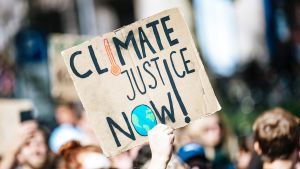 Climate and the Environment
Climate and the Environment
But public opinion is sharply divided along partisan lines, 2022 Chicago Council Survey data finds.
